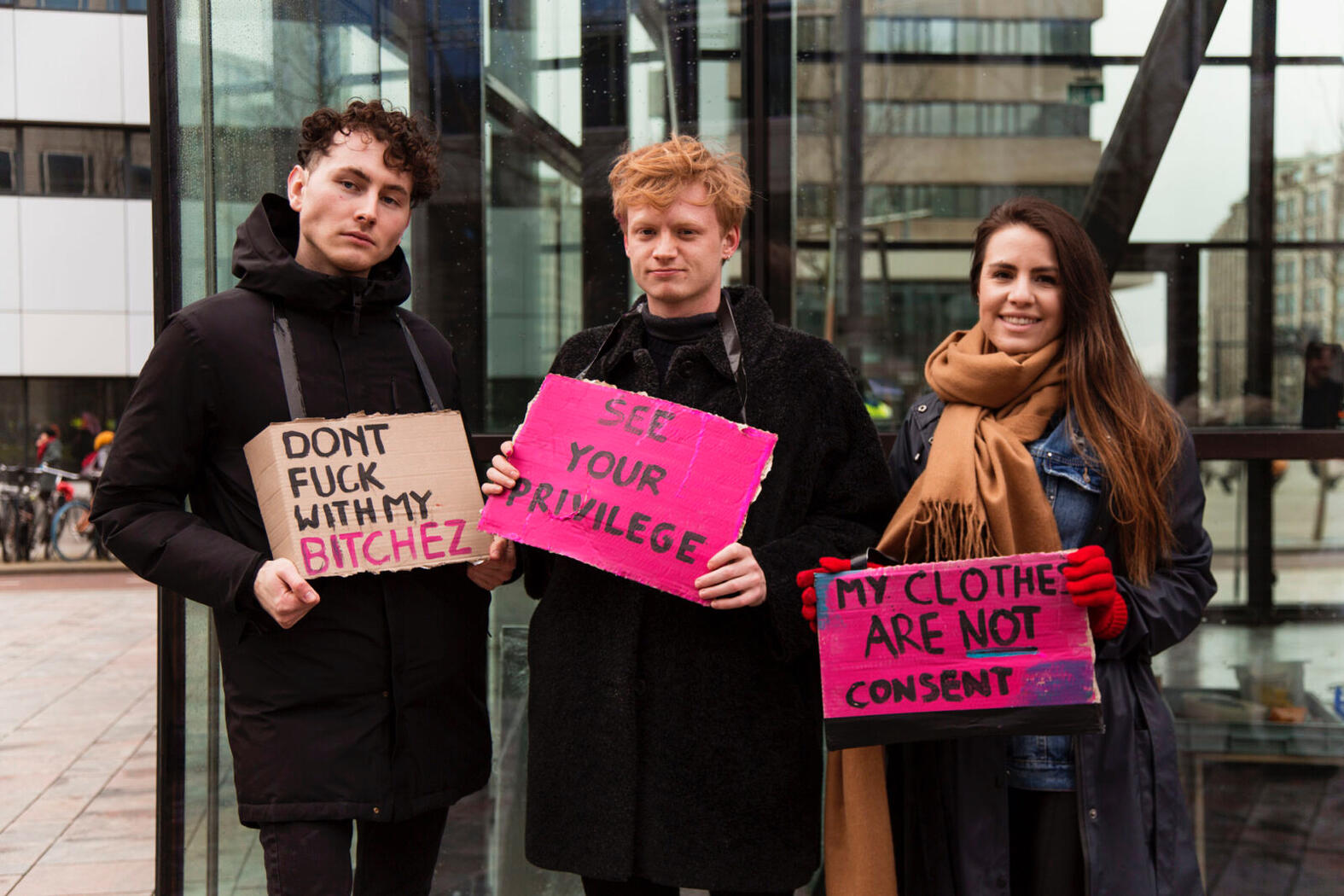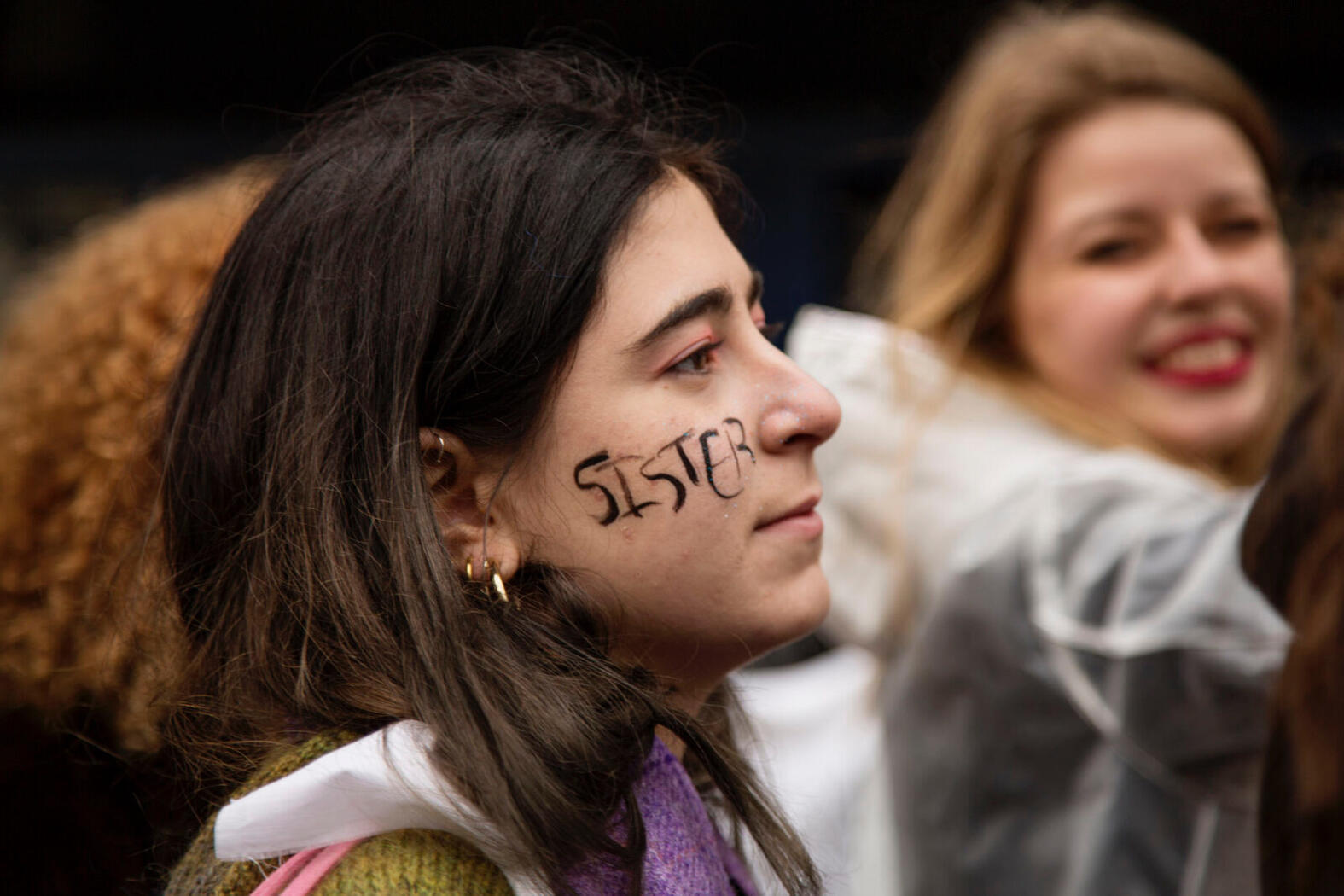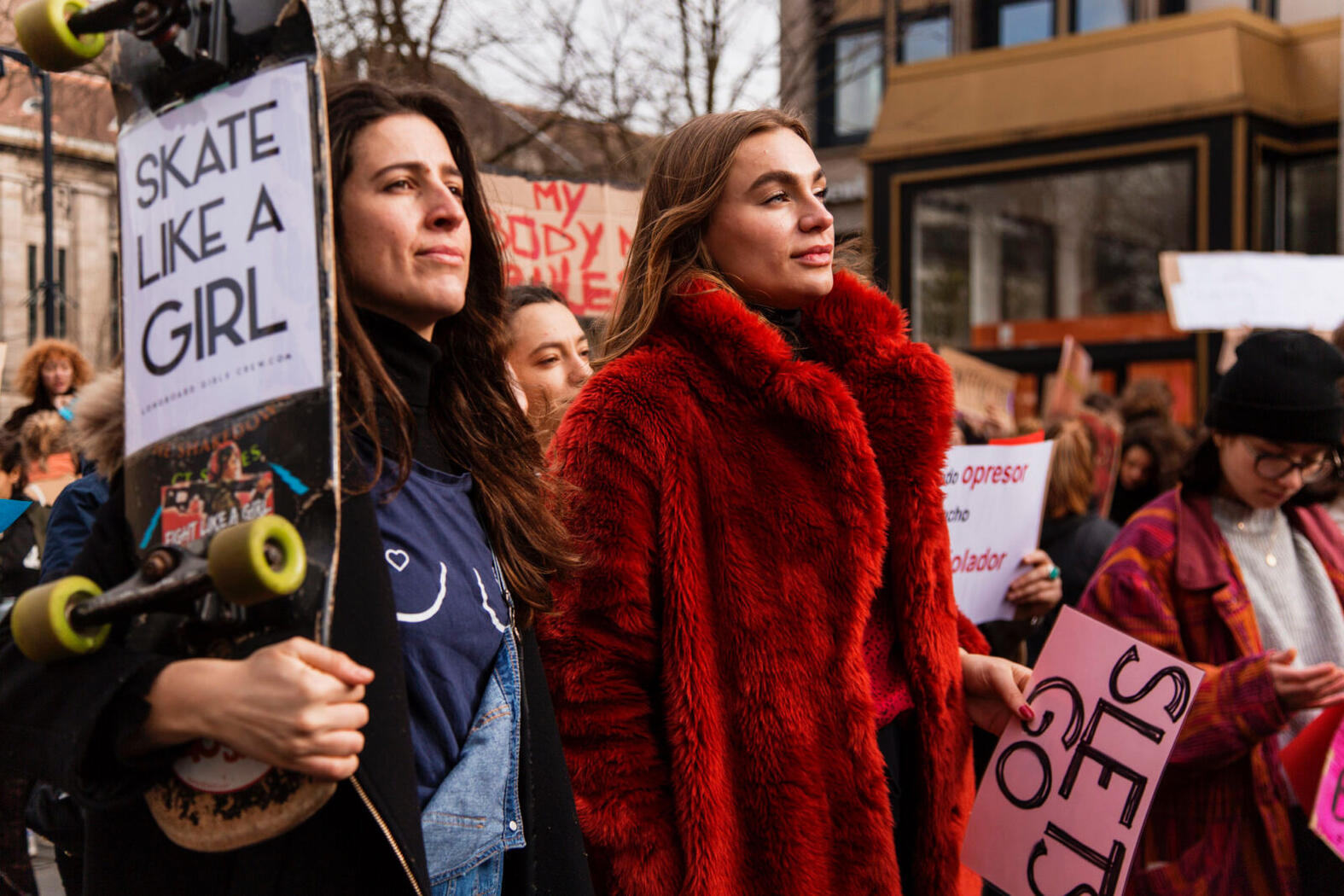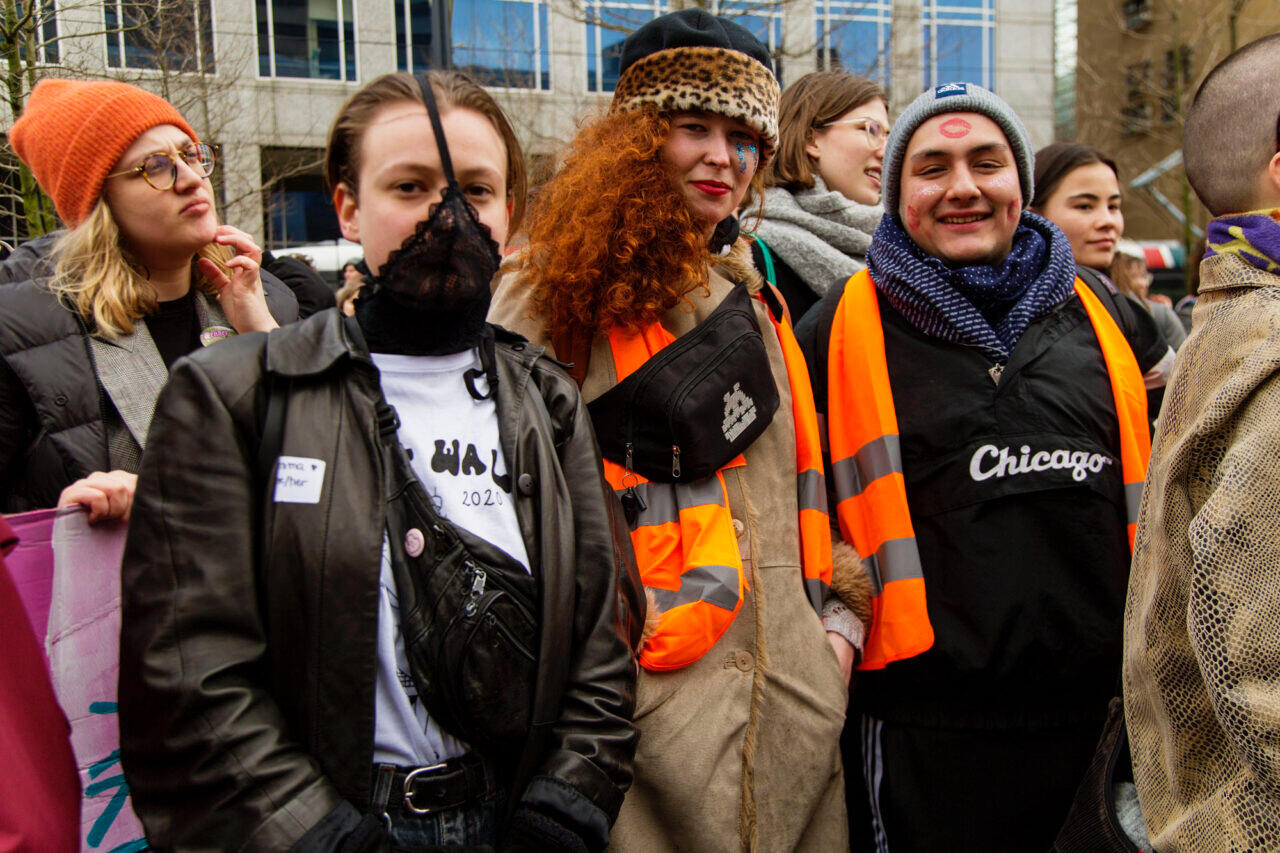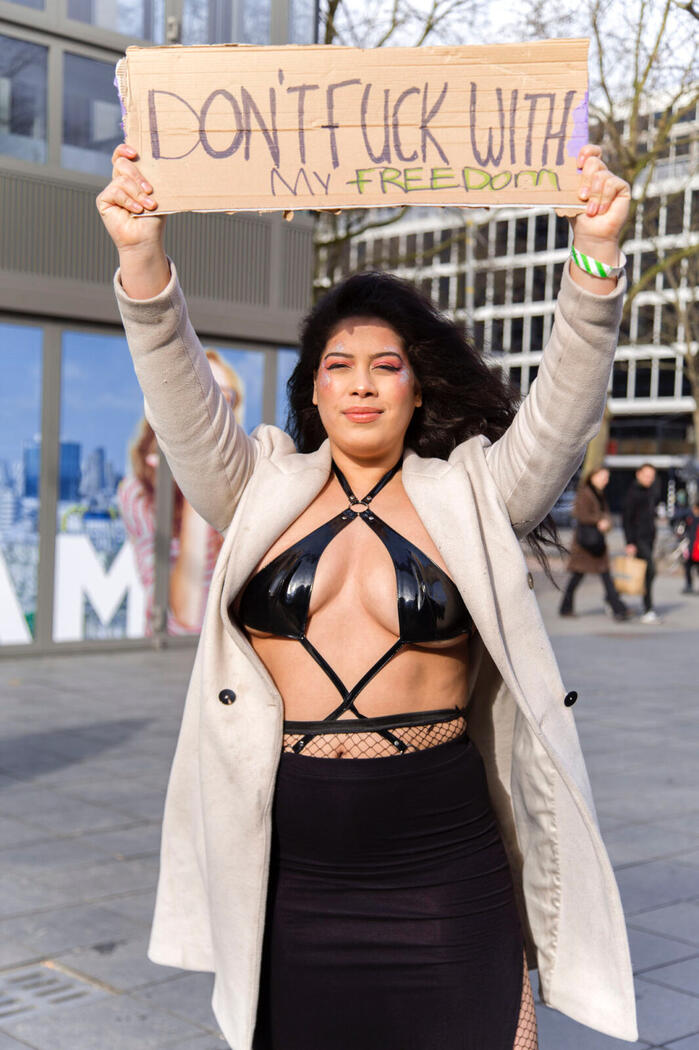THE SLUTWALK
My body, my rules.
part i
part ii here
Vy Truong (534698), Wiebke Aepkers (530437) & Anqie Dong (529984)
About the SLUTWALK

SlutWalk? You may be wondering what it is, and this curiosity sparked an interest that has led you to our page! Or maybe you have already heard of it and you simply want to learn a little more about the movement that has been growing ever since 2011. SlutWalk is the movement that has fought with strength and dignity against rape culture and the severely harmful consequences rape culture causes, such as slut shaming or victim blaming the sexual assault victims.
To protest against this, women march while being dressed “slutty” and scantily around the world. With different things to experience during the march, from guest speakers to workshops, from live music to open microphones, from chanting to dancing, women are embracing their voice to speak louder than ever before and have the chance to speak about their own rape surviving experience.
In Rotterdam, the yearly slut walk is organised by KONTRA. KONTRA seeks to discover and explore the fine lines between art and activism, while looking for countercultures.
KONTRA states:
“As allies of the SlutWalk Rotterdam, we JOIN FORCES to:
- condemn gender-based violence and harassment;
- advocate for more holistic safer spaces;
- raise awareness on rape and assault, discrimination and racism, inequality and sexism;
- formalise a dynamic ethic code for the Slutwalk Rotterdam 2020, that stems from a common conception of intersectional feminism;
- inspire the participants of the Slutwalk Rotterdam with our ethic code”
In the Rotterdam SlutWalk, the gender binary is defied, as the movement is for every woman. As many cases of gender-based violence are intertwined with the hegemonic heteronormativity and toxic masculinity, it is important to acknowledge the problem of the binary gender system in society, as well as neo-colonialism, racism and xenophobia.
KONTRA stands for:
1. Anti-violence & no hate speech;
2. Respect for each other’s presence, expression, and opinion;
3. Anti-rape movement & Pro – consent;
4. Anti-racism/misogyny/bigotry and against any behaviour that stems from xenophobia, racism, homophobia, and transphobia;
5. No to body shaming (of any sort);
6. Anti-beauty standardization, YES to exploring your personal aesthetics;
7. Solidarity of any kind;
8. Active and shared protection attitude: by holding each other accountable in a constructive manner;
9. Women and queers to the front!
KONTRA claims SPACE:
“As a celebration of communal individualism, we want participants to encourage each other, and especially the womxn, to speak out and be comfortable in claiming their space.
Like an octopus we have a collective body moving through space, with different limbs that carry their own consciousness.”
“MY BODY, MY RULES”.
History of the SLUTWALK
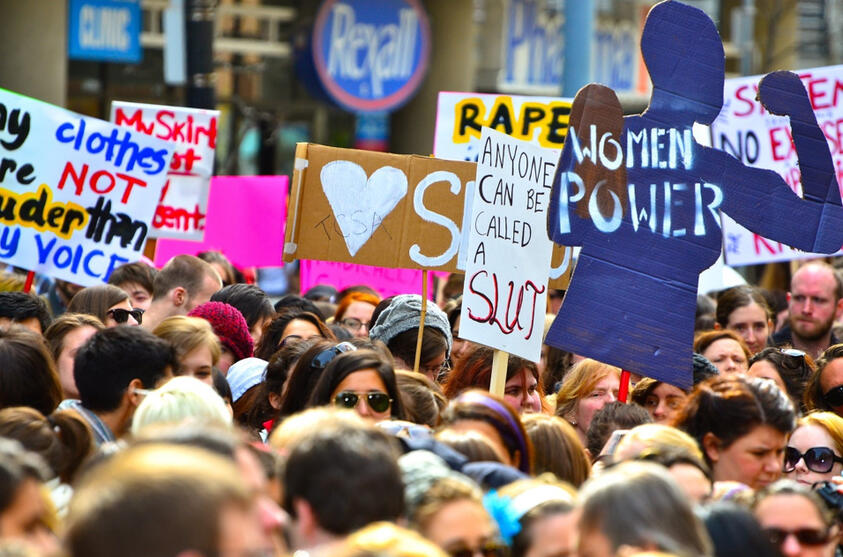
This is a picture of the first SlutWalk in Toronto, Canada.
SlutWalk first emerged in Toronto, Canada in 2011 as a resistance movement to the police’ statement, “Women should avoid dressing up like sluts”, when addressing how to end sexual assaults. Angry and frustrated, these women started a series of rallies to respond to this problematic statement, additionally reclaiming the word “sluts” to end the victim-blaming narratives. Gradually, the SlutWalk movement became known globally, with women and others all over the world participating to take over the streets to disrupt the hegemonic, political and patriarchal order.
The word “slut" has always been a taboo subject in our culture, permeated with slut-shaming and victim-blaming. Young women are expected to perform their sexuality in the most passive way as possible, and everything a woman does can be seen as contributing to the possibility of her being harassed in the future. A SlutWalk attendee in the 2017 event in LA said that “I own my body. My body is not a political playground. It’s not a place for legislation. It’s me and it’s my future.” This particular interview has marked one of the most important moments of the Internet, and if you are interested, you can watch it here:
Needless to say, women are constantly blamed for our sexuality, and more, from behaviour to dress style and clothes, could be seen as contributing to sexual assault and harassment. Our bodies are subject to our own rules and nothing else. Our bodies are not a political playground.
Movements such as SlutWalk reclaim the position of who can define the word “sluts”. The idea of a “slut” that was defined by the Toronto Police officer is extremely problematic and reductionist, as someone who “dresses like a slut” is somehow less deserving as a human and deserving of rape and sexual assault.
SlutWalk as a movement has opened up so many dialogues behind sexual harassment, victimization as well as challenging patriarchal beliefs, eventually contributing to safer streets that all women can enjoy. On that day, women reclaim the streets, be visible and “still not asking for it.”
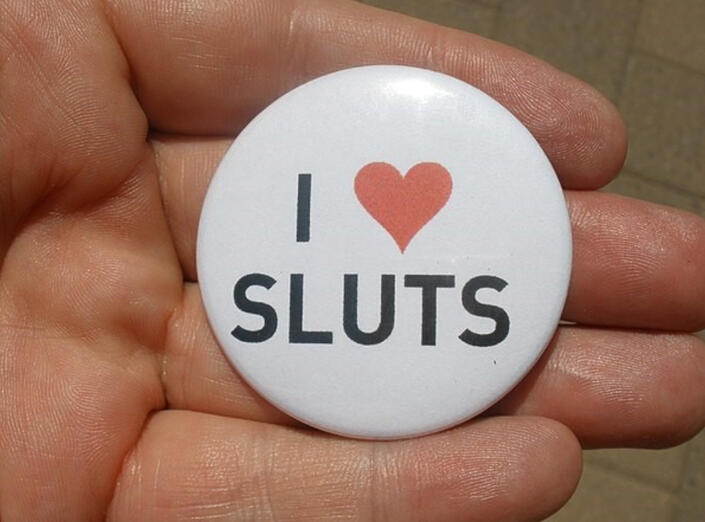
I love sluts badge in Denver, 2011
Since the first series of rallies in Toronto, SlutStand has become a transnational grass-root protest movement and furthermore came to major US cities such as LA, New York and Chicago. SlutWalk also came to Australia and major spots within Europe such as Ireland, Switzerland, England and the Netherlands. In Latin America, SlutWalk has become a major feminist movement and countries like Brazil, Venezuela, Chile, Peru, Colombia and more. The grass-root organizers in these countries have eventually formed a network to help each other to organise their own movements in their countries, additionally adopting the names “Marchas das Vadias” or “La Marcha de las Putas” for the movement.
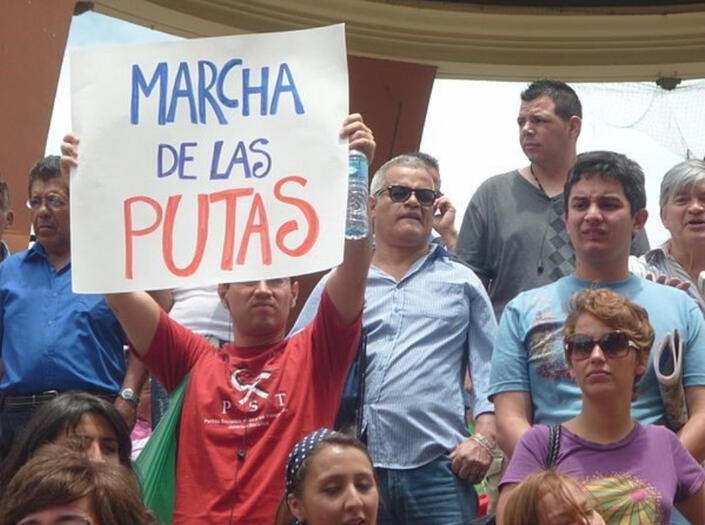
Marcha de las Putas in Costa Rica, 2011
The first SlutWalk in Asia was organized in Seoul, South Korea, on July 16, 2011, and has been an annual event each year to raise awareness on female sexual liberation and sexual harrassment in Korea. Other major cities such as New Delhi, Kolkata and Singapore also participated in the global rallies to reclaim female sexuality and fight the oppressive patriarchy. Needless to say, women all over the world have created a collective movement that empower them, and that what makes SlutWalk such a distinctive, unique and important movement worldwide.
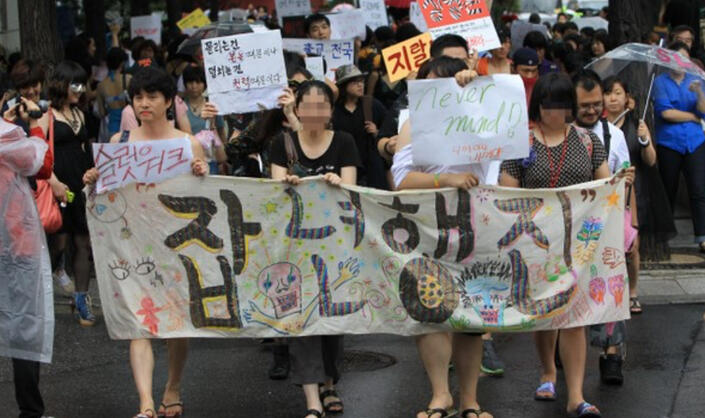
My experience with SlutWalk 2020
Hi guys! My name is Vy and I’ll tell you guys about my participation in the SlutWalk Rotterdam 2020 (pre-Covid)! The experience has been my first step to get involved in transforming Rotterdam by taking part in grassroot activism, and I will forever be grateful for this.
I am unfortunately not in this video, but I appeared in an IGTV that you can find here
Before the actual event, I had the opportunity to help out at the SlutWalk pre-party that was held in MONO in Crosswijk, Rotterdam. The purpose of the party was to kick start SlutWalk the next day and also fundraise for Kontra as an organization. We had the opportunity to see a full female collective to DJ, Ampfeminine (who you can find here).
The night was amazing as I was bathed in a collective feminine (and also very inclusive) energy, and I felt extremely safe to celebrate myself and my identity in this space thanks to the house rules of the space (no sexual harassment, no being disrespectful, always ask for consent).
For this year, I participated as a volunteer to help with all the events and also on the SlutWalk day, which takes place at Rotterdam Central on the 8th of March. I first started my shift at Roodkapje to help the sign-making event, where all the marchers gathered at the venue and Kontra provided them with tools to make signs that they could use for the march. All of the people who participated in the protest are then separated into smaller groups so that it is easier to manage the large turnout we had that year.
First of all, we heard a speech from the organizers of Kontra to kick off SlutWalk, and then we marched from Rotterdam Central to the area near Pathe and finally ended up near the square at Beurs/Lijnbaan. At the square, some handouts are given out by the SlutWalk team, and we all chanted to the famous piece “Un violador en tu camino” by the feminist collective Las Tesis.
I had the most fun at the square and the collective performance! I remembered next to me, there were a group of white straight men that were extremely enthusiastic.
When we were chanting “My body, my rules”, the men next to me were also chanting with us “Your bodies, your rules”, which made me feel extremely touched and I felt so empowered in that moment.
Later, I had a talk with one of the men in the group and he expressed that he’s always worried whenever his mom or his girlfriend comes home late, which motivates him to advocate for sexual harrassment and for a safer streets of Rotterdam and eventually he participated in the SlutWalk with his friends for that reason.
This has made me really think about how events like the SlutWalk is extremely important in the context of transforming our city; as we reclaim the streets and raise our collective voices at the policy makers and the police so that eventually we can make Rotterdam safe for the citizens living here.
Here are some of the pictures taken at the protest that I would love to share with everyone:
Overall, I would like to give thanks to the journalists at Erasmus Magazine that has provided me with these amazing photos that bring back my memories for the SlutWalk. It was an amazing and empowering experience that I had with Kontra, where women, feminine identities and other marginalised groups reclaim the streets of Rotterdam that, on any other day, would make us extremely uncomfortable to navigate otherwise. I truly believe that resistance movements that fight against the patriarchy as well as the hegemonic pressure to conform like the SlutWalk are extremely important to maintain social sustainability within our city; and with these movements, we are all fighting for a more inclusive Rotterdam.
Written by Vy
Interview with SlutStand 2021 Organizer
Hello everybody, I hope you like my experience working with the SlutWalk Rotterdam 2020. This year, unfortunately, I did not participate in the event, so I have invited my friend who is part of the SlutStand 2021 organizers to talk about their experiences working with Kontra on changing the political dialogue of Rotterdam. If you are interested, you can read my experience as a volunteer for the SlutWalk 2020 here.
Tell us a little bit about you – your name, age, pronouns, your role at the Slutstand, whatever that you are comfortable sharing with us!
My name is T. I am 19 years old. I go by they/them and she/her and I am currently studying Pyschology at Erasmus. I was the organizer at Kontra at the SlutStand, in theory, but on the SlutStand day I was assigned the position of the floor angel because Kontra was lacking staff and they need more people to organize the event so that the cops wouldn’t arrest us.
How do you know about the SlutWalk/SlutStand movement and how did you participate?
I have been a long-term follower of Kontra. I really enjoy their efforts and contributions to Rotterdam and when there was a call for the SlutStand organizers I signed up to join the team!
Since the annual SlutWalk has been called as the SlutStand this year, can you tell us the differences between the annual event and the event from this year?
Because of the global pandemic, which made it extremely difficult to walk the walk this year! So a standing demonstration was the one that checked all the boxes in our opinion. However, in times of Covid, we still received a huge turn out this year, which really proves the spirits of the people living in Rotterdam.
How was your overall experience at the SlutStand Rotterdam 2021?
I had a lot of fun! And I also think that I am healed after the event, as I have always considered feminism as a safe space for me as I was actively involved in the movement. I feel like I was some sort of an active agent … and I feel like I even forgot about my trauma, considering how my trauma is political in its nature. So overall I felt really healing.
Did you encounter any problems as an organizer of the SlutStand?
Not at all. The only problem that I encountered was that I was in the position of a volunteer instead of an organizer on the SlutStand day, but taken into consideration Kontras’ core members consist of two people, I think that there was more stuff that they expected to do than to assign us with clear guidelines on being organizers at the stand. But in general, the goal of SlutStand and other grass-root movements is to reclaim the street, and I think that they already did an amazing job this year.
What is your most favourite thing about the SlutStand this year?
In general, I feel very happy because I can volunteer and participate in something that I really believe in. I think feminist events and demonstrations that are truly intersectional are still missing from the dialogue of the city, like even in my neighborhood we even have our own Women’s Union, but their approaches are usually very narrow and corporate-oriented. This is why I feel extremely proud to be a part of SlutStand this year – because Kontra sets their goal of being intersectional and they did really commit to it.
What is the FemFest? Do you also participate in the FemFest Rotterdam?
FemFest is an event that ran alongside with the SlutStand, and happened during the week of the demonstration. I did not participate in organising the FemFest in particular because I was having my final week at school [laughs], but I looked at the event catalogue and everything was really interesting!
How many speakers were at the stand this year?
We had around 6-8 speakers during the stand that happened at Schouwburgplein. There were a lot of topics discussed from a lot of amazing intersectional speakers! We had sex workers, disability advocates, etc. We even had a candidate from BIJ1!
As a non-binary person, do you feel included in the SlutStand and the feminist paradigm in general?
I think it depends! For Kontra and Slutstand, their approach is extremely intersectional and queer-friendly, so I feel very included. But I have seen some feminist events, especially those at our university – I do not feel included at all.
As an international organizer, do face any exclusion at the SlutStand specifically?
Not at all! There are a lot of amazing organizers at the stand, and I feel very welcome. Also everybody is very cute [laughs] and I feel very included and celebrated.
How do you feel about grassroot activism in Rotterdam such as the SlutStand? Do you think they are important in transforming the political context of the city?
Yes! Absolutely. But I am not extremely involved in a lot of activities so I do not have enough experience to comment on the grassroot activism scene in Rotterdam. But based on my experience so far, it’s extremely amazing (beside from the planning), I made valuable memories and I really treasure my time being involved in activism in Rotterdam.
I do not know if this relates to grassroot activism [laughs] but at some point, in my second year in university, I became quite disillusioned with academia. I think academia has created a classist and excluding environment and is not accessible to everybody. Like they have always said that science should be a public goods but it has not been like that. My program is also quite apolitical; I realized that Psychology is not really a safe space for me to express my voice, which eventually makes me disillusioned in academia. With grassroot activism, it’s a much more of a safer space – I feel like I can actually be me, and I can even help others in their political journey.
The interview left me a lot of thought about our city, taking over the streets and grassroot activism in general. T left me thinking about the importance of grassroot feminist events, and I feel extremely [inspired] after talking with them. I hope that you can take something from their own experiences like I did, and rethink the value of resistance in transforming our city of Rotterdam.
Written by Vy
The linguistics of rape culture: The fundamental importance of reclaiming language
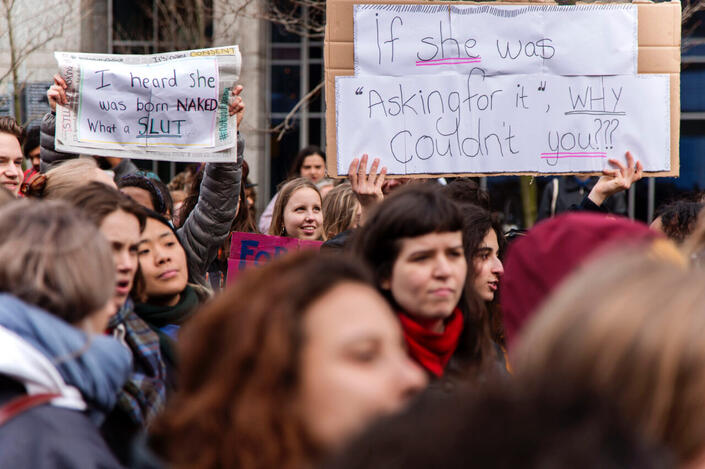
As you have probably learned by reading this page, the SlutWalk is in many ways about women reclaiming the word “slut” for themselves and thereby challenging the common victim-blaming narrative around the topic of sexual harassment and rape.
While the exact epistemological origin of the word Slut is unclear, one of its first identified uses was in Geoffrey Chaucer’s The Canterbury Tales in 1387 in which the word ironically referred to the unorderly appearance of a man. Only later on was is reinvented as a word to describe women, specifically those that worked or were forced to work in prostitution.
Today, the word is exclusively used to describe women. Most of the time it is in reference to their sexual promiscuity and meant as an insult to shame them socially. To this day, there is no word in the English dictionary that could be seen as an equivalent that would be applicable to a man.
To many, the word “Slut" might not seem of much relevance and they might therefore not comprehend why there is an entire global women’s movement committed to reclaiming it. However, the word itself is of utmost importance and illustrates a vital example of the problematic role language holds in the maintenance of the patriarchy and ultimately rape culture. Besides wrongfully shaming women in their expression of their sexuality and thereby taking away from them the status of an independent sexual being, the word reinforces the victim-blaming narrative that the patriarchal rape culture thrives on. This becomes visible whenever, horrifyingly, one of the first questions harassment victims are asked is “what were you wearing?”. As if clothing had any place in a conversation like that. The word “Slut" thereby implies an active role of women in their harassment or rape. As if being a Slut, be it through clothing, her makeup, her behavior, or any other indicator that would categorize them as such could justifying the assault as “their own fault”. The implications of the word and the assumptions it makes about women’s sexuality has been used as a reason in favor of assaulters and rapists that too often even lead to them not being prosecuted for their crimes.
In many ways, language and the way we talk about sexual harassment in general is often part of the problem and ultimately a way to uphold the discriminatory systems. While the system might be socially constructed, its institutions is what makes them real by having real-life consequences. Rape culture is no exceptions as it is being reinforced in fundamental institutions of our societies, be it through “justice” courts through their rulings against the victim of assault, through schools through their dress codes for girls to not “provoke” their make peers, or seemingly innocent justification by your neighbours’ parents playing off their child’s violent and toxic behaviours as “boys will be boys”. All of these things accumulate to what eventually makes up what we call the rape culture.
Unfortunately, the word “slut" is by far not the only example of how language reinforces our existing rape culture and surrounding patriarchy. During this year’s women’s history month and in the context of the recent murder of Sarah Everard on her way home in London, the discussion about common rhetoric surrounding sexual harassment and safe spaces for women was reintroduced.
As an answer to the very apparent lack of safe spaces for women within London (or any city for that matter), the city’s ultimate solution was to encourage women to simply refrain from going outside after a certain hour. To make a statement and to counter these discussions, Baroness Jenny Jones, as a response, proposed a curfew of 6 pm for men to the House of Lords later that month, which represented an equivalent law to the suggestions that have been made about women “just staying home at night”. The anger and sheer outrage she received from the (mostly male) British public only proved the point she was trying to make. It exposed the hypocrisy in expectations surrounding men and women, clearly indicating that gender equality is far from the “oh-so progressive” Western reality.
This instance then draws attention to the paradoxically female-centered rhetoric in the realm of sexual violence. Karen Kilgraff and Georgia Hardstark in their book “Stay Sexy & Don’t Get Murdered” point out the absurdity of how we keep talking about “how many women were raped last year”, not “how many men raped women”. Or we report “how many teenage girls got pregnant last year in England” instead of saying how many “teenage boys got girls pregnant”. They argue that this passive voice has political consequences for women that reinforced the victim-blaming narrative. They draw attention to the highly problematic nature of the commonly used phrase “violence against women” as it shifts the focus off of boys and men and onto girls and women. I myself have nonchalantly used these phrases without a second thought even though I would consider myself well-informed feminist. But I guess this only goes to show how deeply ingrained it is into our system and, once again, proving that many of us have come accustomed to the language that actively victimises women.
In the grand scheme, challenging patriarchic language is essential in the fight against the persistence of rape culture within our society. The SlutWalk’s ambition of changing language by reclaiming the word “slut” and re-coding it by giving it an empowering meaning is therefore a crucial first step towards female empowerment and male accountability. It could be the beginning of the vicious victim-blaming, men-protecting cycle that has been going on pretty much unchecked for decades. While the reclaiming of a simple word like Slut might seem like a very small step within a grand system of gender inequality, it is a very important one. What is becoming clear is that word like that and inevitably language itself is at the foundation of said system. It is what enables (or prevents) us from expressing our opinions, helps us talk about issues, and a tool to challenge and criticize them. And due to its fundamental nature, language is ultimately able to bring down that foundation, which is already starting to crackle by updating the meaning of Slut to someone independent, proud and empowered.
